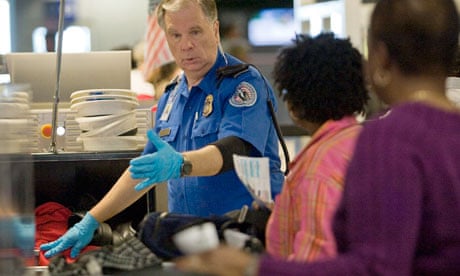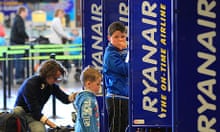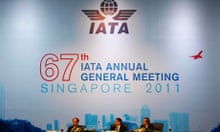Airline passengers in the US could be handed a shortcut through security checks under a government plan to give favourable treatment to low-risk travellers.
The plan would allow passengers who agree to supply personal data to US officials to receive a less stringent examination at airport departure lounges. The head of the US Transportation Security Administration (TSA), John Pistole, said travellers who supplied information such as frequent flyer details and travel records in advance would pass through security areas more quickly.
"We have been working for the last six months in trying to develop a programme that allows us to differentiate between those who are regular travellers and those who are not," he said.
It is understood that a pilot programme could get under way before the end of the year, involving at least one airport but limited to US passport holders or domestic travellers. The trial is likely to be watched closely in the UK, where the transport secretary, Philip Hammond, has pledged to review airport security.
Speaking at the annual general meeting of the International Air Transport Association (IATA) in Singapore, Pistole said treating every passenger with the same level of scrutiny was inefficient. "We recognise that one size does not fit all."
This week, the IATA unveiled a vision of what the TSA checks could look like, with a "checkpoint of the future" that funnels passengers into three security lanes: enhanced security, normal security and "known traveller". Passengers are allocated the appropriate lane by an iris-recognition system linked to a government database, with known travellers going via a single, elongated arch through an x-ray check, a metal detector and a check for liquids. Checks that are known to frustrate millions of passengers, such as shoe scans, would be avoided.
Stringent security measures in the US are a source of frustration within the aviation industry, with British Airways among the most outspoken critics of a regime that, owing to the sheer size and profitability of the market, has the power to dictate global trends. For instance, the European commission admitted last month that it had been forced to abandon a partial relaxation of the ban on carrying liquids on to planes after pressure from the US government.
Sir Martin Broughton, chairman of BA, has warned that the industry is "kowtowing" to American security concerns. In a speech earlier this year he said: "The current procedures have grown, Topsy-like, with each new procedure being superimposed on the existing structure every time there is a new security incident.
"Every time, it's a procedure to stop a repeat of what has already been attempted rather than a programme to prevent the next new attempt by terrorists."
Backing the use of government data to create passenger watchlists, he added: "We need to be using data better – data that we and governments have."
Also speaking at the IATA, the secretary general of Interpol warned that air passengers were at risk after the theft of 28m passports and national identity cards. Ron Noble said Interpol was concerned that terrorists could slip into countries undetected because governments were failing to share information on stolen identities.
"The number one risk confronting airlines and countries around the world is the risk terrorists or other dangerous persons will carry a fraudulent identity document and move from one country to another," he said.
Noble added that last year 40,000 passengers were caught with illegally obtained IDs, with the true number of fraudulent travellers likely to be even higher because of a lack of stringent checks.




Comments (…)
Sign in or create your Guardian account to join the discussion